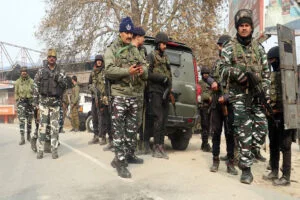
Why in news?
- The recent extension of the Armed Forces (Special Powers) Act (AFSPA), 1958, in Nagaland has sparked discussions on its implications and the context behind such a decision.
Extension of AFSPA in Nagaland:
- The Centre has extended The Armed Forces (Special Powers) Act in eight districts and 21 police stations across Nagaland, declaring them as “disturbed areas” for another six months, effective from April 1 to September 30, 2024.
- This decision highlights the ongoing concerns regarding the law and order situation in certain regions of the state.
Areas Affected by the Extension:
- The extension covers eight districts, including Dimapur, Niuland, Chumoukedima, Mon, Kiphire, Noklak, Phek, and Peren, along with 21 police stations in five other districts.
- These areas have been identified as prone to disturbances, necessitating the continuation of The Armed Forces (Special Powers) Act to maintain public order and security.
Reasons Behind the Extension:
- The decision to extend The Armed Forces (Special Powers) Act in Nagaland stems from a comprehensive review of the prevailing law and order situation in the state.
- Despite previous efforts to reduce the “disturbed areas,” concerns persist regarding the security challenges faced by the administration.
Legal Framework and Supreme Court’s View:
- The The Armed Forces (Special Powers) Act empowers both state and central governments to issue notifications designating areas as “disturbed” and extend the application of the act.
- The Supreme Court, in a landmark judgement, outlined the criteria for invoking The Armed Forces (Special Powers) Act , emphasizing the need for periodic reviews and consultations with the state government.
Historical Context of AFSPA in Nagaland:
- The imposition of The Armed Forces (Special Powers) Act in Nagaland dates back to 1995, amidst escalating violence and insurgency in the region.
- The act was enacted to equip security forces with enhanced powers to combat armed movements and maintain public order in the face of persistent challenges.
Implications and Criticisms:
- While The Armed Forces (Special Powers) Act provides security forces with necessary authority to address security threats, it has also faced criticism for alleged human rights violations and excessive use of force.
- Critics argue that the act grants unchecked powers to security personnel, leading to instances of abuse and impunity.
Role of AFSPA in Maintaining Public Order:
- The Armed Forces (Special Powers) Act plays a crucial role in enabling security forces to tackle insurgency and maintain stability in conflict-affected areas.
- However, its effectiveness is often debated, with calls for greater accountability and transparency in its implementation.
Conclusion:
- The extension of AFSPA in Nagaland underscores the complex security challenges confronting the region and the government’s efforts to address them.
- While the act provides necessary tools for combating insurgency and maintaining public order, its application must be balanced with respect for human rights and the rule of law.
- Moving forward, a holistic approach involving dialogue, development initiatives, and effective governance is essential to address the underlying causes of unrest and pave the way for lasting peace and stability in Nagaland.
People also ask
Q1: What is AFSPA, and why is it significant in Nagaland?
Ans: The Armed Forces (Special Powers) Act (AFSPA), 1958, grants special powers to the armed forces to maintain public order in “disturbed areas.” In Nagaland, AFSPA has been in force since 1995 due to persistent security challenges and insurgency.
Q2: Why has the Centre extended AFSPA in Nagaland?
Ans: The extension of AFSPA in Nagaland for another six months is based on a comprehensive review of the prevailing law and order situation in the state. Concerns regarding security challenges and the need to maintain public order have led to this decision.
Q3: Which areas are affected by the extension of AFSPA in Nagaland?
Ans: The extension covers eight districts, including Dimapur, Niuland, Chumoukedima, Mon, Kiphire, Noklak, Phek, and Peren, along with 21 police stations in five other districts.
Q4: What legal framework governs the extension of AFSPA in Nagaland?
Ans: Both the state and central governments have the authority to issue notifications designating areas as “disturbed” and extend the application of AFSPA. The Supreme Court has outlined criteria for invoking AFSPA, emphasizing periodic reviews and consultations with the state government.
I don’t think the title of your article matches the content lol. Just kidding, mainly because I had some doubts after reading the article.